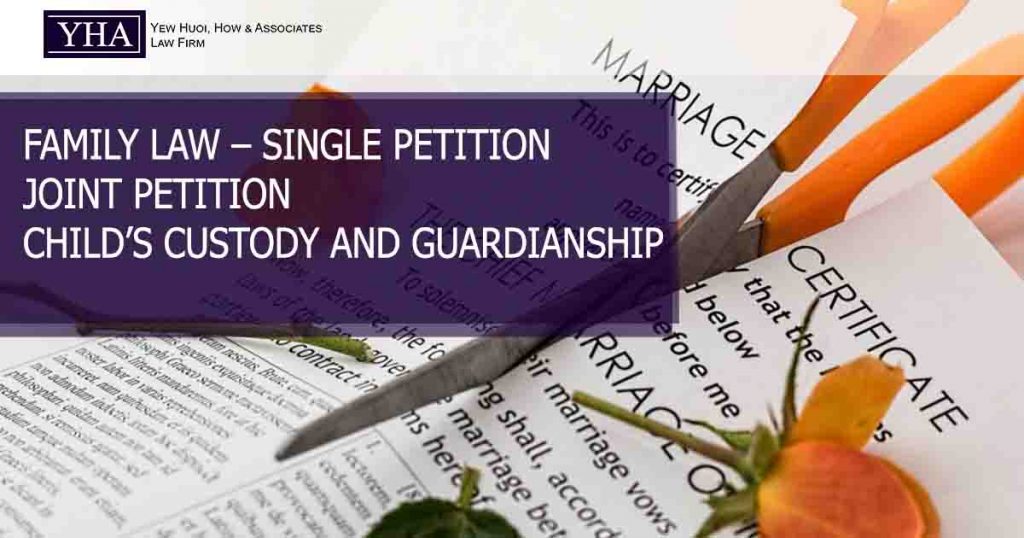2 Ways to file for Divorce
- Single Petition
- Joint Petition
Single Petition
- EITHER party who wants to divorce can petition the court for divorce.
- Single Petition is more complicated. It takes longer time. Usually, it takes one or more than 1 year if it is disputed.
- Before the filing of single petition, both the husband and wife (“both parties”) are required to attend three (3) sessions of counselling/reconciliation.
- Both parties are required to go to Jabatan Pendaftaran Negara (“JPN”) and fill up Form KC14.
- Thereafter, both parties will be referred to a conciliatory body.
- JPN officer will arrange three (3) marriage counselling sessions. Attendance is compulsory.
- If either party fails/refuses to attend to the counselling session, JPN will issue a failure to reconcile letter.
- You are required to forward the letter to your lawyer. Your lawyer will have to file in an application to the Court to exempt you from having to re-attend counselling/reconciliation session.
- After obtaining the order for exemption of reconciliation from the Court, you may then proceed to file in your Single Petition.
What are the requirements to file in a Single Petition?
- The marriage is registered in Malaysia;
- Both parties reside in Malaysia; and
- Both parties are married for at least two (2) years.
Exceptions to the requirements: –
1. One party to the marriage has converted to Islam; and/or
2. The marriage has irretrievably broken down by some other reasons.
Under what circumstances I can file a Single Petition?
- One of the parties in the marriage has behaved in such a way that the other party could not live with him/her (ie. domestic violence);
- One of the parties to the marriage has committed adultery;
- Both parties have lived apart for at least two (2) years before the filing of the Single Petition; and/or
- One of the parties in the marriage has deserted another party for at least two (2) years before the filing in of the Single Petition.
Joint Petition
- BOTH parties mutually agree to dissolve their marriage.
- No requirement to prove that the marriage has broken down.
- Arrangements must be made for: –
1. Maintenance;
2. Division of matrimonial assets;
3. Children’s custody & visitation; and/or
4. Who bears the legal fee. - After the filing of the Joint Petition, a hearing date will be set for the court to consider the Joint Petition.
- Both parties are required to attend court on the scheduled date for hearing of the Joint Petition.
- Both parties will be granted a Decree Nisi for divorce. If there is no objection raised, the Decree Nisi will be made absolute (Absolute Decree) after three (3) months.
- When a decree is made absolute, both parties will be considered single again.
- The entire process will take approximately three (3) to five (5) months depending on Court’s schedule.
What happens to the child after divorce?
Custody of Child
- Custody of the child can be agreed upon to be given to either parent in a Joint Petition.
- Custody relates to who takes care of the child’s daily needs. Access can be granted by the other party who does not have custody.
- However, if custody is disputed, the Court will decide custody of the child after taking into consideration of: –
1. The welfare of the child;
2. The wishes of the parents; and/or
3. The wishes of the child, if he/she is capable to express an independent opinion. - If the child is below seven (7) years old, the Court would presume that it is for the best interest of the child to be with his/her mother.
- However, this presumption is rebuttable if any parties can provide proof that the mother is not fit to have the custody of the child.
Guardianship of Child
- Usually, joint guardianship will be granted to both parents.
- Guardianship relates to control and management of the child’s property, religion, support, health and education.
- The Court will decide the guardianship of the child after taking into consideration: –
1. The welfare of the child; and/or
2. The wishes of the parents. - The Court may at any time remove any guardian or appoint another person to be the guardian of the child.

